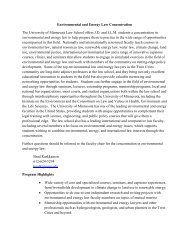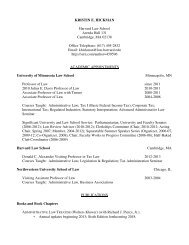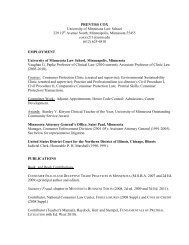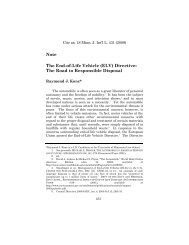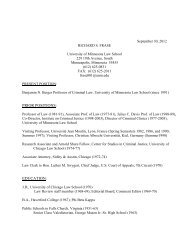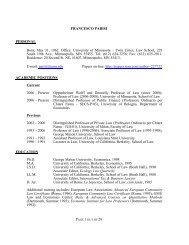Enabling Private Ordering - the University of Minnesota Law School
Enabling Private Ordering - the University of Minnesota Law School
Enabling Private Ordering - the University of Minnesota Law School
Create successful ePaper yourself
Turn your PDF publications into a flip-book with our unique Google optimized e-Paper software.
52 MINNESOTA JOURNAL OF INT’L LAW [Vol. 18:1<br />
settlement bodies found a rule <strong>of</strong> international law that<br />
prevented States from bridging <strong>the</strong> difference between contract<br />
claims and treaty claims by granting diplomatic protection and<br />
submitting contract claims to international dispute settlement.<br />
Much to <strong>the</strong> contrary, <strong>the</strong> case law confirms that international<br />
law did not prevent States from espousing claims <strong>of</strong> <strong>the</strong>ir<br />
nationals against <strong>the</strong> host State, even in a case where <strong>the</strong><br />
alleged breach only concerned a violation <strong>of</strong> national law. In<br />
addition, <strong>the</strong> pertinent decisions do not reflect a presumption<br />
against litigating breaches <strong>of</strong> municipal law in inter-State<br />
proceedings as long as <strong>the</strong> jurisdictional basis can be reasonably<br />
interpreted as covering claims for <strong>the</strong> breach <strong>of</strong> municipal law or<br />
commercial breaches <strong>of</strong> investor-State contracts. This case law<br />
and <strong>the</strong> underlying State practice <strong>the</strong>refore call into question<br />
<strong>the</strong> restrictive approach to interpreting umbrella clauses that<br />
elevates <strong>the</strong> contract claim/treaty claim distinction into a<br />
doctrine <strong>of</strong> international law that could not be undone by<br />
international treaties.<br />
2. Broadly Worded Arbitration Clauses in Investment Treaties<br />
That <strong>the</strong> national/international law divide is not as strict as<br />
suggested by those who support a restrictive interpretation <strong>of</strong><br />
umbrella clauses can also be seen in broadly worded arbitration<br />
clauses under many investment treaties that enable investors to<br />
bring “any dispute relating to investments.” 140 Arbitral tribunals<br />
have interpreted such clauses as allowing foreign investors to<br />
bring claims based on <strong>the</strong> violation <strong>of</strong> investor-State contracts<br />
without alleging any separate violation <strong>of</strong> <strong>the</strong> investment treaty<br />
in question, such as fair and equitable treatment or indirect<br />
expropriation.<br />
The Tribunals in Salini v. Morocco 141 and Consortium RFCC<br />
v. Morocco, 142 for example, had to consider <strong>the</strong> scope <strong>of</strong> Art. 8 <strong>of</strong><br />
139. For a discussion <strong>of</strong> broad arbitration clauses, see Jörn Griebel, Jurisdiction<br />
over “Contract Claims” in Treaty-Based Investment Arbitration on <strong>the</strong> Basis <strong>of</strong> Wide<br />
Dispute Settlement Clauses in Investment Agreements, 4 TRANSNAT’L DISP. MGMT.<br />
(Sept. 2007); Jörn Griebel, Die Einbeziehung von “contract claims” in internationale<br />
Investitionsstreitigkeiten über Streitbeilegungsklauseln in<br />
Investitionsschutzabkommen, 4 ZEITSCHRIFT FÜR SCHIEDSVERFAHREN<br />
[SCHIEDSVZ]/GERMAN ARB. J. 306 (2006). See also Gaffney & L<strong>of</strong>tis, supra note 4, at<br />
13–15.<br />
141. Salini Costruttori S.p.A. and Italstrade S.p.A. v. Kingdom <strong>of</strong> Morocco,<br />
ICSID (W. Bank) Case No. ARB/00/4, Decision on Jurisdiction (July 23, 2001).<br />
142. Consortium RFCC v. Morocco, ICSID (W. Bank) Case No. ARB/00/6,



